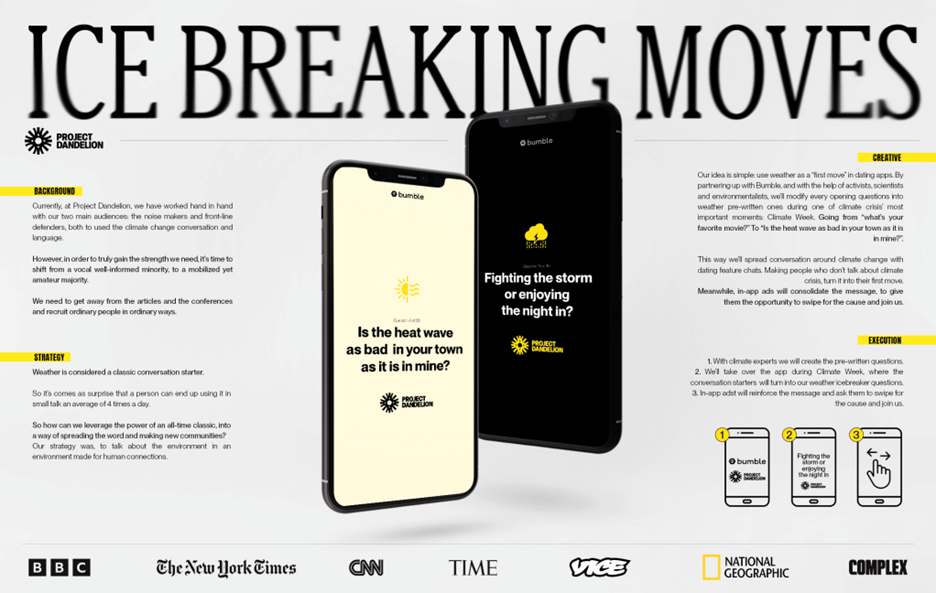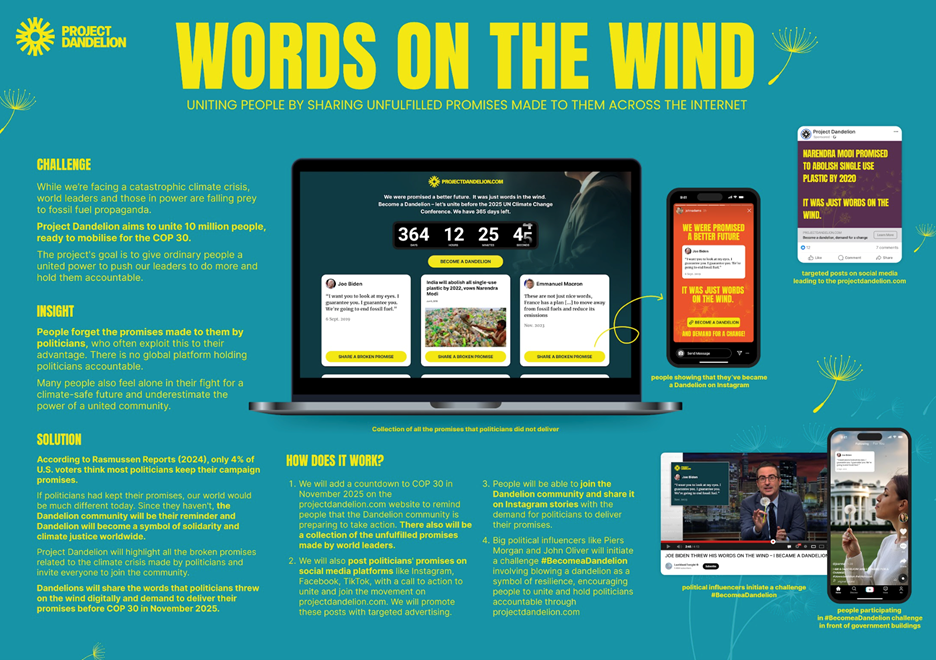At this year's Cannes Lions International Festival of Creativity, Project Dandelion made waves in the Young Lions Competition, showcasing the ingenuity of the next generation of creative talent. With 448 competitors from 69 countries, the competition was a true testament to creativity and innovation in tackling one of the most pressing issues of our time: climate change.
Dance of the Dandelions: Vision & Challenge
Project Dandelion was conceived with the understanding that the climate crisis is as much a communications crisis as it is an environmental one. The gap in effective communication has allowed fossil fuel companies to spend billions on misinformation, dividing the public and stalling progress. Project Dandelion aims to bridge this gap by creating a unified mass mobilization campaign that reaches a global audience, building a climate-safe future for all.
Inspired by the resilience of the dandelion, which blooms on every continent, Project Dandelion's goal is to seed more dandelions -- more leaders, more activists, and more informed citizens. This project seeks to provide tools for leaders and social justice organizations to reach new audiences, show solidarity with frontline leaders, and apply public pressure on global leaders to prioritize climate justice.
Blue Sky Action: The Winners
Gold: Mexico's Innovative Approach
The gold-winning entry from Mexico stood out for its ingenious use of a dating app to facilitate climate conversations. Recognizing that dating apps are popular among young people, the team transformed typical icebreaker questions into climate-focused prompts. Instead of asking about favorite movies or hobbies, users were prompted to discuss their thoughts on climate action and sustainability.
This creative approach not only sparked meaningful dialogues about climate change but also engaged a demographic that is crucial for the future of the planet. The use of an existing platform in a novel way demonstrated the potential of digital tools to foster awareness and drive action. The simplicity and effectiveness of the idea captivated the judges, earning Mexico the top prize.

Silver: Kazakhstan's Educational Game
The silver-winning entry from Kazakhstan took a different but equally impactful approach. The team developed an educational game aimed at younger audiences, teaching them about the effects of climate change and the importance of sustainable practices. The game featured interactive elements that allowed players to make decisions and see the consequences of their actions in a simulated environment.
This entry was praised for its focus on education and long-term impact. By targeting children, the campaign aimed to instill a sense of responsibility and awareness from a young age, ensuring that the next generation is better equipped to handle the challenges of climate change. The engaging format of a game made learning fun and accessible, significantly enhancing its potential reach and effectiveness.

Bronze: Portugal's Virtual Reality Experience
The bronze-winning entry from Portugal utilized virtual reality (VR) to create an immersive experience that highlighted the devastating effects of climate change. Users were able to explore different environments affected by climate change, from melting ice caps to deforested areas, providing a visceral understanding of the issue.
The VR experience was designed to evoke an emotional response, making the abstract concept of climate change tangible and urgent. By allowing users to "experience" the impact firsthand, the campaign aimed to inspire immediate action and commitment to sustainable practices. The innovative use of technology and the powerful storytelling earned Portugal a well-deserved place among the winners.
Connective Patterns Across the Winners
Engagement through Familiar Platforms
One of the standout features of the winning entries was their use of familiar platforms in novel ways. Mexico's dating app approach leveraged an everyday activity to introduce critical conversations about climate change, making the topic more relatable and engaging. This strategy effectively captured the attention of users who might not otherwise engage with climate-related content.
Educational and Long-Term Impact
Kazakhstan's educational game highlighted the importance of targeting younger audiences to ensure a long-term impact. By integrating climate education into a fun and interactive format, the campaign aimed to create lasting knowledge and awareness among children. This approach underscores the need for early education in fostering a more environmentally conscious generation.
Emotional and Immersive Experiences
Portugal's VR experience demonstrated the power of immersive technology in conveying the urgency of climate change. By creating a tangible and emotional connection to the issue, the campaign aimed to inspire immediate action and commitment. The use of VR highlighted how technology can be harnessed to create powerful and impactful storytelling.
The Future Outlook
Project Dandelion's success at Cannes Lions is a testament to the power of creativity and innovation in addressing global challenges. By engaging young minds and leveraging technology, these campaigns have shown that it is possible to inspire meaningful action and foster a unified approach to climate justice.
As we continue to face the growing threat of climate change, initiatives like Project Dandelion remind us of the importance of communication, education, and innovation. By supporting and amplifying the voices of the next generation, we can build a more informed and motivated global community, truly allowing young hearts and minds to run free and create a sustainable future for all.
For more information on Project Dandelion visit www.ProjectDandelion.com
Click the social buttons to share this story with colleagues and friends.
The opinions expressed here are the author's views and do not necessarily represent the views of